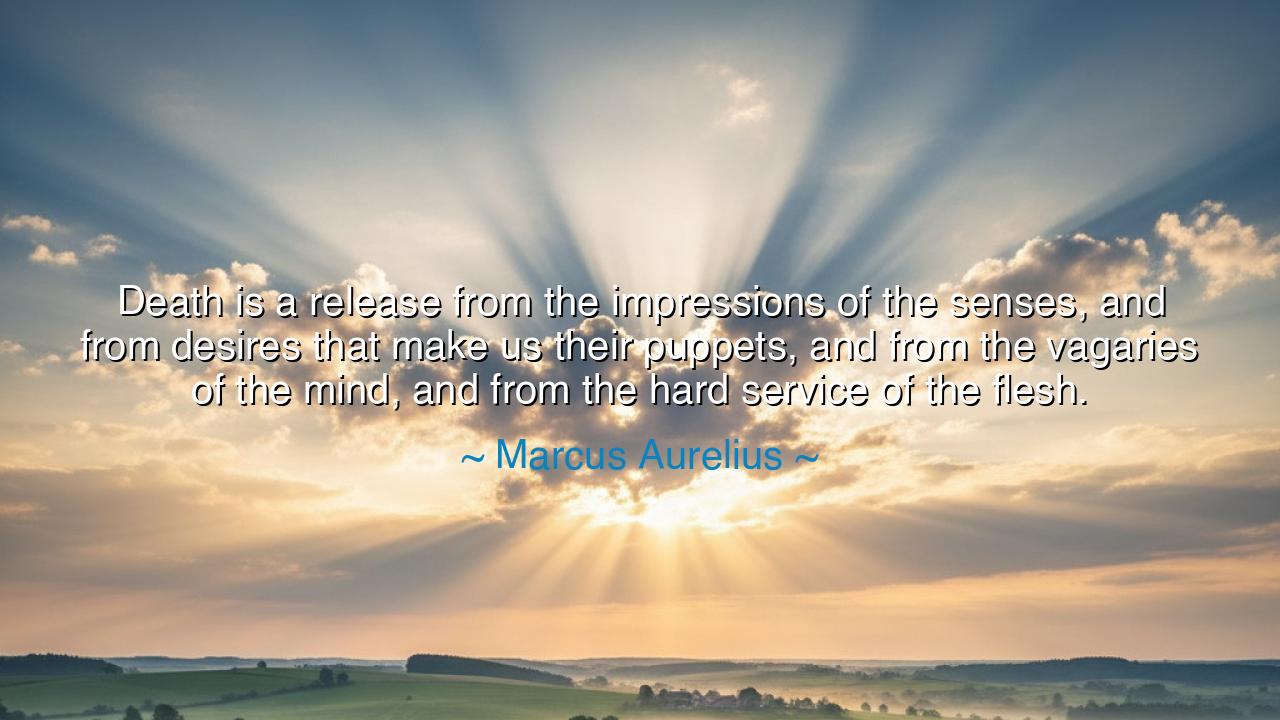
Death is a release from the impressions of the senses, and from
Death is a release from the impressions of the senses, and from desires that make us their puppets, and from the vagaries of the mind, and from the hard service of the flesh.






When Marcus Aurelius wrote, “Death is a release from the impressions of the senses, and from desires that make us their puppets, and from the vagaries of the mind, and from the hard service of the flesh,” he spoke as both a philosopher and an emperor, as a man who ruled nations yet sought mastery over himself. His words are not a lamentation, but a serene reflection born from the ancient discipline of Stoicism, which teaches that peace is found not in avoiding death, but in understanding it. To Marcus, death was not a terror to flee from, but a liberation — a gentle unbinding of the soul from the restless chains of the body and the mind. It was not the end of life’s meaning, but the moment when the self is freed from illusion and turmoil, returning to the vast order of the universe.
The origin of this quote lies within Marcus Aurelius’ Meditations, a private collection of thoughts written during his years as ruler of Rome in the second century. Surrounded by war, plague, and political upheaval, Marcus lived constantly in the shadow of mortality. Yet in his solitude — in his tent on the frontiers or in the quiet of the night — he turned inward, writing not to the empire but to his own soul. His reflections on death came not from despair, but from deep acceptance. He saw clearly how human life is consumed by sensation, desire, and the endless churning of thought. These, he observed, enslave us — making us puppets of emotion, chasing pleasure, fearing pain, and laboring under the tyranny of the body. To die, then, is not to be punished, but to be released from the bondage of these lower forces.
The meaning of his words flows like a river from the wellspring of Stoic philosophy. To the Stoics, the body and its senses are instruments — necessary, but not ultimate. The soul, or the rational spirit, is the true essence of man. Yet it is often drowned beneath the noise of the senses, driven by cravings and fears that make us act without wisdom. Death, in this view, is the moment when the soul is freed from its servitude to the body — no longer subject to hunger, lust, vanity, or pain. It is the great silence that restores the spirit’s purity. Marcus did not see death as annihilation, but as natural transformation, the return of one small flame to the greater fire of the cosmos. As he often wrote, “What dies does not vanish — it changes.”
Consider the story of Socrates, who centuries before Marcus Aurelius, met his death with calmness and clarity. Condemned to drink poison for teaching truth, Socrates told his disciples not to weep, for death was but the separation of the soul from the body, and in that release lay freedom from corruption. His body might perish, but his reason, his love of truth, would endure. This same spirit animates Marcus’ reflection. Both men understood that fear of death is born from attachment — to possessions, to pleasure, to identity. Yet when one has lived with virtue, when one has sought truth and practiced self-command, death loses its sting. It becomes not an enemy, but a completion — the final act of harmony with nature’s law.
Marcus’ insight also unveils a deeper understanding of life itself. If death is a release from the slavery of desire and the tyranny of the senses, then wisdom must consist in freeing oneself from these chains while still alive. Why wait for death to bring the peace that can be achieved through discipline? The Stoic strives daily to govern his passions, to quiet his restless mind, to lighten the burdens of fleshly indulgence. In doing so, he practices a kind of spiritual death — dying to vanity, greed, and impulse — so that he may live with serenity even amid chaos. To conquer fear of death, one must first conquer the self.
Even in our own age, Marcus Aurelius’ teaching endures. We live surrounded by distractions that enslave the mind — endless pleasures, relentless desires, the constant hunger for approval. We chase sensations as though they were salvation, only to find ourselves exhausted and empty. Marcus reminds us that freedom lies not in having more, but in needing less. To live well is to prepare for death — not in morbid dread, but in quiet readiness. When we learn to detach from the transient and cling instead to what is eternal — virtue, wisdom, compassion — we become unafraid of the inevitable.
So take this lesson, child of the modern world: do not fear death, but fear the unlived life — the life enslaved by appetite, consumed by noise, blind to truth. Seek instead the stillness of mind, the mastery of desire, the grace of self-restraint. Remember, as Marcus Aurelius teaches, that death is no curse but a release — the soul’s return from service to rest. Live each day so that when death comes, you may greet it not as a thief, but as a friend — for it will take nothing from you that you have not already learned to give away. And in that surrender, you will find the peace that even emperors sought: the peace of a spirit free.






AAdministratorAdministrator
Welcome, honored guests. Please leave a comment, we will respond soon